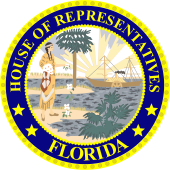Julio Gonzalez (Florida politician)
Julio Gonzalez (born May 30, 1964) is a Republican politician and a former member of the Florida House of Representatives, representing the 74th District, which includes Englewood, North Port, and Venice in Sarasota County, from 2014 to 2018. In 2018, Gonzalez lost the Republican primary for Florida's 17th congressional district by a large margin.
Julio Gonzalez | |
|---|---|
 | |
| Member of the Florida House of Representatives from the 74th district | |
| In office November 4, 2014 – November 6, 2018 | |
| Preceded by | Doug Holder |
| Succeeded by | James Buchanan |
| Personal details | |
| Born | May 30, 1964 Miami, Florida |
| Political party | Republican |
| Spouse(s) | Gina Arabitg |
| Children | Monica Gonzalez, Jessica Gonzalez |
| Alma mater | University of Miami (M.D.) Stetson University (J.D.) |
| Profession | Orthopedic surgeon |
| Military service | |
| Allegiance | |
| Branch/service | |
| Years of service | 1992-1995 |
| Unit | Medical Corps |
History
Gonzalez was born in Miami, Florida, and attended Belen Jesuit Preparatory School, graduating in 1982, and then the Leonard M. Miller School of Medicine at the University of Miami, receiving his Doctor of Medicine in 1990. After graduation, Gonzalez completed an internship in internal medicine at the Naval Medical Center Portsmouth, and then joined the United States Navy Reserve as a medical officer from 1992 to 1995. He moved to Jacksonville, where he completed orthopaedic surgery training at UF Health Jacksonville, and then to Orlando, where he practiced knee reconstructive and shoulder surgery. In 2004, Gonzalez moved to Venice, and began working at the Venice Regional Medical Center, eventually becoming the Chief of Surgery, Chief of Staff, and the representative to the Board of Trustees.
Florida House of Representatives
In 2014, incumbent State Representative Doug Holder was unable to seek re-election due to term limits, so Gonzalez ran to succeed him. He faced attorney Richard DeNapoli in the Republican primary, and a brutal campaign ensued. Gonzalez attacked DeNapoli over allegations that he lived outside the district and over his past support of former Governor Charlie Crist,[1] while Gonzalez was attacked for campaign contributions that he made to Congresswoman Debbie Wasserman Schultz, also the Chairwoman of the Democratic National Committee. Gonzalez asserted that he made the contributions in order to meet with Wasserman Schultz to discuss his opposition to the Patient Protection and Affordable Care Act, but Gonzalez had made the contributions in 2008, and the legislation was not proposed until 2009.[2] Groups supporting DeNapoli also aired advertisements attacking Gonzalez over a book that he wrote in 2009 called "Health Care Reform — The Truth," in which Gonzalez called for the "creation of health index scores for patients who need medical care," and that, "Once the patient reaches that health index score, government and insurance funding designed to cure major illnesses such as cancer should be discontinued. For the sake of the patient, his loved ones and our economy, efforts should be redirected from curative to supportive." The advertisements claimed that Gonzalez was advocating for death panels "worse than those in Obamacare," but Gonzalez "said he was only pointing out the problem that patients now can be put through prolonged, painful treatments when there is not chance of medicine helping them."[3] Gonzalez campaigned on his opposition to the Common Core standards, to the expansion of Medicaid under the Patient Protection and Affordable Care Act, and to legislation that would allow "undocumented immigrants who graduate from Florida high schools to get in-state college tuition rates,"[4] and was endorsed by United States Senator Marco Rubio, who praised Gonzalez for "living the American Dream."[5] Gonzalez ended up defeating DeNapoi by a wide margin, receiving 57% of the vote, and he advanced to the general election. He faced only write-in opposition and won with nearly 100% of the vote.
In February 2017, The Florida Bar published an article opposing a bill sponsored by Gonzalez that allows the legislature to overrule a supreme court decision with a two-thirds vote.[6]
References
- Wallace, Jeremy (July 7, 2014). "House candidate: Someone's peeking in my windows". Sarasota Herald-Tribune. Retrieved December 10, 2014.
- Ashtari, Shadee (April 18, 2014). "GOP Candidate Says He Donated To Pro-Obamacare Democrat To Defeat Nonexistent Health Law". The Huffington Post. Retrieved December 10, 2014.
- Wallace, Jeremy (July 20, 2014). "Attack ads appear in District 74 battle". Sarasota Herald-Tribune. Retrieved December 10, 2014.
- Wallace, Jeremy (August 26, 2014). "Florida House District 74: Julio Gonzalez". Sarasota Herald-Tribune. Retrieved December 10, 2014.
- "Marco Rubio endorses Julio Gonzalez in HD 74". Sunshine State News. May 16, 2014. Archived from the original on December 21, 2014. Retrieved December 10, 2014.
- Blankenship, Gary (February 15, 2017). "Bar opposes court override measure". The Florida Bar News. 44 (4). Retrieved February 14, 2017.
If it makes it before a legislative committee, The Florida Bar will oppose a proposed constitutional amendment to allow the Legislature by a two-thirds vote to overrule a Supreme Court or other state court finding that a state statute is unconstitutional. The Bar Board of Governors, at its January 20 meeting, also took a position that any such attempt at passing a similar amendment for federal courts in Congress should be opposed. Those actions came in response to the filing of House Joint Resolution 121 by Rep. Julio Gonzalez, R-Venice (See story in the January 15 Bar News.) to allow the Legislature to override a court decision striking down a statute within five years of the court action.
